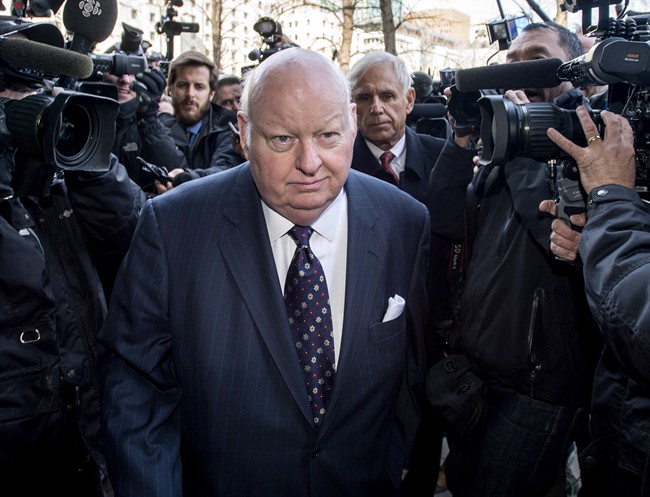OTTAWA – The Senate has never defined in its own rules what constitutes a primary or secondary residence, or how many days a senator must live there, the upper chamber’s former law clerk testified Wednesday at Mike Duffy’s fraud and breach of trust trial.

But Mark Audcent, the Crown’s first witness, did say Duffy did not officially become a senator until he was sworn in on Jan. 2, 2009 – more than a week after he filed his first expenses with the upper chamber.
Audcent worked as the law clerk and Parliamentary counsel to senators during Duffy’s five-year tenure, after he was appointed by Prime Minister Stephen Harper in December 2008 to represent Prince Edward Island.
He also helped write the Senate Administrative Rules, known as SARS, which represents the Senate’s fundamental principles.
The rules, however, do not mention primary residence, he testified on cross-examination from Duffy’s lawyer, Donald Bayne.
When it came to claiming living expenses from the Senate, Audcent agreed with Bayne that Duffy had no choice but to put his home in Cavendish, PEI as his primary residence.
But whether Duffy had to claim living expenses in the first place was never answered.
READ MORE: Mike Duffy expected to take the stand in June
Duffy is facing 31 charges for filing allegedly fraudulent living expenses with the Senate, and a bribery charge for accepting $90,000 from Harper’s former chief of staff Nigel Wright.
- What is a halal mortgage? How interest-free home financing works in Canada
- Capital gains changes are ‘really fair,’ Freeland says, as doctors cry foul
- Ontario doctors offer solutions to help address shortage of family physicians
- Canada will take bigger economic hit than U.S. if Trump wins election: report
Audcent was among the officials who gave information sessions to newly-appointed senators about rules and regulations of the upper chamber.
He agreed with Bayne that primary and secondary residence for senators have never been defined, and there were no minimum number of days to spend in a senator’s home province.
“Absolutely not,” Audcent said.
He told the court he did tell senators to have their secretaries keep track of their time spent in their home provinces, if only to address the “natural tension” of working in Ottawa and the constitutional requirement of living where they were appointed.
He agreed with Bayne that after his appointment to the Senate, Duffy’s residence in PEI was the most important residence constitutionally that he could have.
And upon reading from a dictionary, Bayne argued primary residence meant most important.
He also told the court that Duffy paid almost $100,000 to renovate his PEI residence to make it his primary residence.
Court also heard how in 1998, the Senate’s own internal economy committee creating rules for secondary and primary residence in order to claim living expenses if a senator lived more than 100 km from Parliament Hill.
And Bayne said the report linked primary residence with the province in which a senator was appointed to represent.
Bayne also introduced a Jan. 6, 2009 memo from the policy adviser of Conservative Sen. Marjory LeBreton, the former government leader in the Senate, who told Duffy and fellow suspended senator Pamela Wallin that nowhere in Senate rules are questions of residency mentioned.
Audcent said he had his own four-point criteria for understanding residency, which included physical presence, community participation such as voting, government services such as a driver’s license, and societal relations, such as where someone does his banking.
But, there was an assumption that a senator met all the Constitutional requirements when recommended by the prime minister and officially appointed by the governor general.
And if even not, “I never viewed my role as being that of a policeman,” he said.
The trial continues Thursday with Audcent on the stand.


Comments